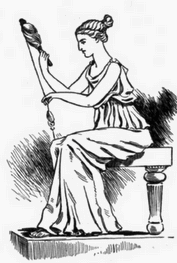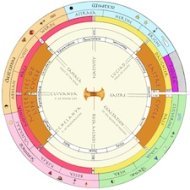The Day of Werde
Confronting our Personal Fate

The Day of Werde falls on the 16th of Vaskaras (23rd August). It is the day on which we contemplate our personal fate and assess the direction of our lives. It is part of the Summer/Autumn Mysteries of Life Cycle of festivals.
The term werde (with a small w) in the faith of Our Mother God means "personal fate" – somewhat in the sense of "karma" as used by Buddhist-influenced Western people (as opposed to its older Sanskrit sense of "ritual action").
Up to a point werde (pronounced "word-uh") is interchangeable with karma in the sense that the things that happen to us are the result of past werde, and the things we do create our future werde, thus our whole life-experience is a result of the interweaving of werde, old and new, and the people around us are shaped by and interacting with their werde, while we are interacting with them.
It is for this reason that werde is often described as a "web of tapestry": countless threads of different colors interweaving to make a whole picture. Each thread with its own destiny, its own choices, its own reason for being, and yet each an integral part of a much greater whole.
For this reason, the Janya Sai Werde – the personal aspect, or divinity, of Fate – is seen as the Great Weaver (or in older terminology Webster). This is perhaps the primary difference between our use of werde (small w) and the current Western use of karma. While it certainly means a wholly personal and individual fate, we have a much higher consciousness of the interweaving of all personal fates and the greater whole that they constitute and also of Werde (big W), the Janya who weaves them all together.
Sai Werde is known as the Daughter of Sai Thamë, the Great Janya who rules the Golden Order of Being – the music that tunes the furthest stars as well as the heart of every being, even to the last blade of grass.
On the Day of Werde, we give praise to the Janya Sai Werde in her three forms, but especially in her central form, Werde herself.
It is also a day for thinking over our own werde – the direction of our lives, the choices we are making and will make. For as choice-making beings, we have a special relation to werde.
Werde's Day is often regarded a day of making resolutions for the future. The secular new year (January 1st) is not truly a new year for us. Our own New Year (Culverine 1st/March 21st) is so taken up with the events of Eastre that personal resolutions have never been a great part of it. The Day of Werde tends to be our greatest Resolution Day, in which we make decisions about where to guide the ship of our soul over the coming months.
See also:
The Wheel of Life: An Introduction to the Three Werdes
Please support the Chapel of Our Mother God
Send Questions or Comments on the Day of Sai Herthe
Chapel of Our Mother God Homepage
All written material at the Chapel of Our Mother God is copyright. Should you wish to reproduce any portion please contact us for permission.
Facebook or Twitter
Wheel of the Year
Articles on the Months, Seasons and Festivals of the year in feminine religion General The High Feast of EastreThe End/Beginning of the Cycle
- All about Eastre: The Last Festival and the First
- An Easter Hymn
- The Marianna Maria Chant
- The True Meaning of the Eastre Egg
- Chelanya: The Feast of Regeneration
- Cuivanya: The Feast of Divine Life
- Tamala: The Feast of the Dead
- All about Nativity
- The Birth of God the Daughter
- Winter Solstice
- The True Meaning of Christmas
- Amaterasu Omikami and the Spiritual Meaning of Midwinter
- The "Christmas Tree"
- The real Christmas Tree Angel
- "Hail to the Princess" carol
- The Day of Our Sovereign Lady
- Maia's Day
- The Day of Werde
- Early Winter Festivals
- The Conception of God the Daughter
- The Day of Sai Herthe
- The Epiphany of Our Lady
See the Wheel of the Year Click below to see the full image of the Sacred Year, or go here for a basic introduction.
